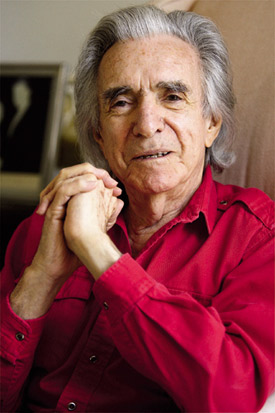BY JESSE HIESTAND
 (Photo Credit: Mark Mainz/Getty Images)
(Photo Credit: Mark Mainz/Getty Images)
After serving in the Royal Canadian Air Force in World War II, Arthur Hiller walked into the Canadian Broadcasting Corp. one afternoon and said, “Who do I see about a job?”
“What kind of job?” the receptionist asked.
He thought about it for a moment and out of his mouth came, “I want to be a director.” Hiller smiles slyly now when he recalls the story. “To this day, I don’t know where it came from.”
It was clearly the right answer, as Hiller excelled in directing radio, television and feature films for more than 50 years, and eventually became president of the DGA.
“I always believed in guilds and was a big union supporter in general,” says Hiller, who eagerly joined the Radio and Television Directors Guild in October 1955, after moving to Los Angeles to work on NBC’s Matinee Theatre. Six months later he signed on with the Screen Directors Guild to do feature work. When the two guilds merged in 1960 to create the DGA, Hiller was poised to make a lasting contribution to the Guild and its members.
Hiller, whose parents were active in Yiddish theater in Edmonton, still draws inspiration from the example set by the Guild’s founders in 1936. “What always impressed me, and what I mentioned at every annual meeting and when I spoke to new directors, was that here were these men who could all make their own deals, but who cared enough about their fellow directors that they set up a guild to help,” says Hiller. “I’d say, ‘Remember that—we are here to help each other.’ That’s the wonderful thing that those guys did.”
While he is too humble to admit it, Hiller is a part of that living tradition. With a disarming charm, he acknowledges his contributions in a matter-of-fact way. He has served on the National Board in various capacities since 1971 before being elected DGA president in 1989, a position he held until 1993. He’s been on the Western Directors Council since 1997, several negotiating committees, and the President’s Committee since its inception in 1986. He was presented with the DGA Honorary Life Member Award in 1993 and the Robert B. Aldrich Achievement Award in 1999.
“Being DGA president was a tremendous responsibility,” he said. “You’re talking about people’s livelihoods, about pension plans and health plans and residuals. And if you make a decision that’s good for 5,000 and it’s not good for five people, then I think, ‘What did I do for those five people?’”
Hiller devoted a lot of energy to creative rights and diversity issues, helping to set up the first committee to advance opportunities for women and minorities. He was also a strong advocate of film preservation and was the founding chairman of the Artists Rights Foundation and the DGA’s representative to the National Film Preservation Board.
Hiller was just as active professionally as he was in the Guild. He worked on series such as The Third Man, Perry Mason, The Rifleman, Gunsmoke and Alfred Hitchcock Presents. He moved almost exclusively into feature films in the mid-1960s, directing The Americanization of Emily, The Hospital, Silver Streak, The In-Laws and Outrageous Fortune, among many others. His 1970 film Love Story was nominated for a DGA Award and a best director Oscar, and won a Golden Globe for best director.
Despite a busy career, he always found time to serve the Guild and was elected president of the Academy of Motion Picture Arts and Sciences from 1993 to 1997. His dedication to the DGA was, he says, a way of giving back to the organization that supported him, and a way to set an example for future leaders.
“I don’t think it’s a matter of pride as much as being happy to have been a part of that because you couldn’t do it alone. That’s the wonderful thing about our Guild—how much we work together and how much caring there is about each other.”